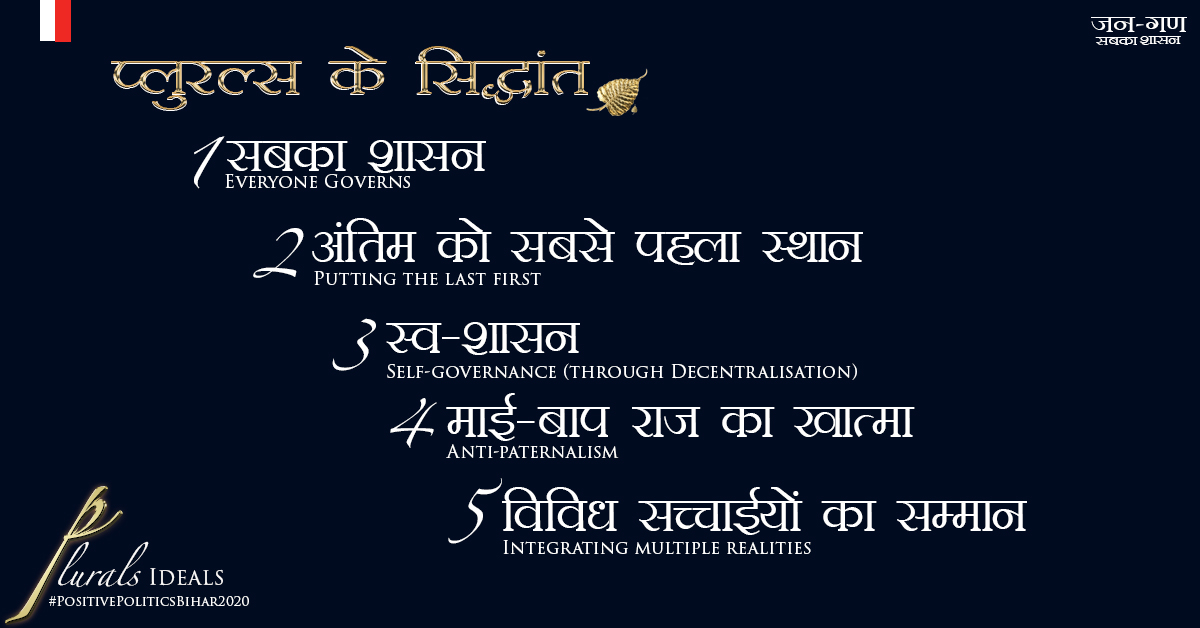IDEALS

A couple of months ago I was asked by one of our elderly fellow citizen, a farmer in Nalanda.
“aap kya karna chahti hain (what do you want to do)?” I replied “Bihar ko badalna chahti hun bas
(only want to change Bihar).” He smiled and with an incredible composure said “rajaneeti ka star
itna gir gaya hai, sachche logon ke liye mushkil hai, kaise kariyega (the level of politics has
fallen so much, difficult for good people, how will you do?).” I answered “rajaneeti mein siddhanton
ko zinda karke, mushkil he sahi (by reviving ideals in politics, no matter how difficult it would be).
He was so pleased to hear it that he talked at a great length about some of our great leaders who were
ideologically and principally committed. I could hear in his voice the same passion for change and hope
that lives inside me.
The one thing that I have disliked most about contemporary politics is the moral decline, dishonesty and
the lack of ideals in political parties. Plurals is born out of values. Let me share with you the five
ideals of Plurals, the reason behind them and the outcome they seek to achieve. These ideas are rooted in
strong morals and unwavering dedication to duty and are in no particular
order - all equally important.
Everyone Governs: You see this in all our communication. One of the central reason for
underdevelopment in Bihar is that the political machine works for and benefits only a few: the so
called VIPs. There exists a strong nexus between politicians and their ‘yes-men- the well connected’.
The entire political machine works only for them and our taxes are abused to favour these few.
Opportunities are hoarded by the well-connected (corrupts) and the ‘righteous’ in this toxic
environment is destroyed very easily. Bihar will grow only when governance includes everyone,
and power and resources are diverted to the real people.
Putting the last first: Power comes from the people, through voting. However, the sense of power
is absurdly twisted in Bihar. For a well governed Bihar, power that comes from the vote of the grassroots
should stay at the grassroots. People who unfortunately are the last in the socially and economically
constructed hierarchy must be given the utmost importance in development. Government should work as a
facilitator that inspires, convenes, enables and transforms lives. If people at the grassroots are not
handed over the power in the form of better public services and efficient policies, then unarguably
Bihar will continue to be the last in all development parameters in the country.
Decentralisation: The government has made a complete mockery of decentralisation in Bihar.
All that decentralisation has been successful in doing is creating power-brokers. The governing
bodies at the lowest tier of governance are mere puppets in the hands of the state government.
This relationship needs to be altered and over-centralisation of power must flow from the state
departments to the lowest tier of governance (not just on ‘files’). They should be trained and
monitored. All the developed nations have well functioning decentralised institutions. Thus, real
decentralisation is non-negotiable for the development of Bihar.
Anti-paternalism: Government is not the parent of people and thus it has no right to set paternalistic
draconian rules. The functioning of the government continues to be extremely authoritarian in Bihar.
The ‘sahab’ culture stems from a paternalistic mindset that needs to be urgently abolished.
Policy-making has a sole purpose of ‘enablement’ and ‘protection’. To give people better services
and protect people from the uncivilised in the society. However, these two key roles are ignored
by the political machine. People are not the nucleus of governance. Those who are meant to be the
protectors are the biggest violators of human rights and law in Bihar.
Integration of multiple-realities: We all have different realities and therefore different problems.
These realities should be integrated by effective policy-making. Bihar is a state of immense potential but
‘one size fit all’ cannot work in Bihar as it is very diverse. The resources, needs and problems are very
different from one region to another and they all need to be incorporated so that no one is left behind.
For a successful state and a better quality of life for ‘everyone’, development should be distributed
responsibly and unbiasedly. Development of Bihar is a far-fetched dream if we do not develop together.
“Build institutions not power-brokers”
Solution : “Move from ‘band-aid’ solutions to ‘Fix the causes of problems’!”
Means : Complete abolition of clientelism, corruption and VIP culture and Zero tolerance towards crime and discrimination.
Motto : Kantian philosophy that “Act so as to treat people always as ends in themselves, never as mere means”